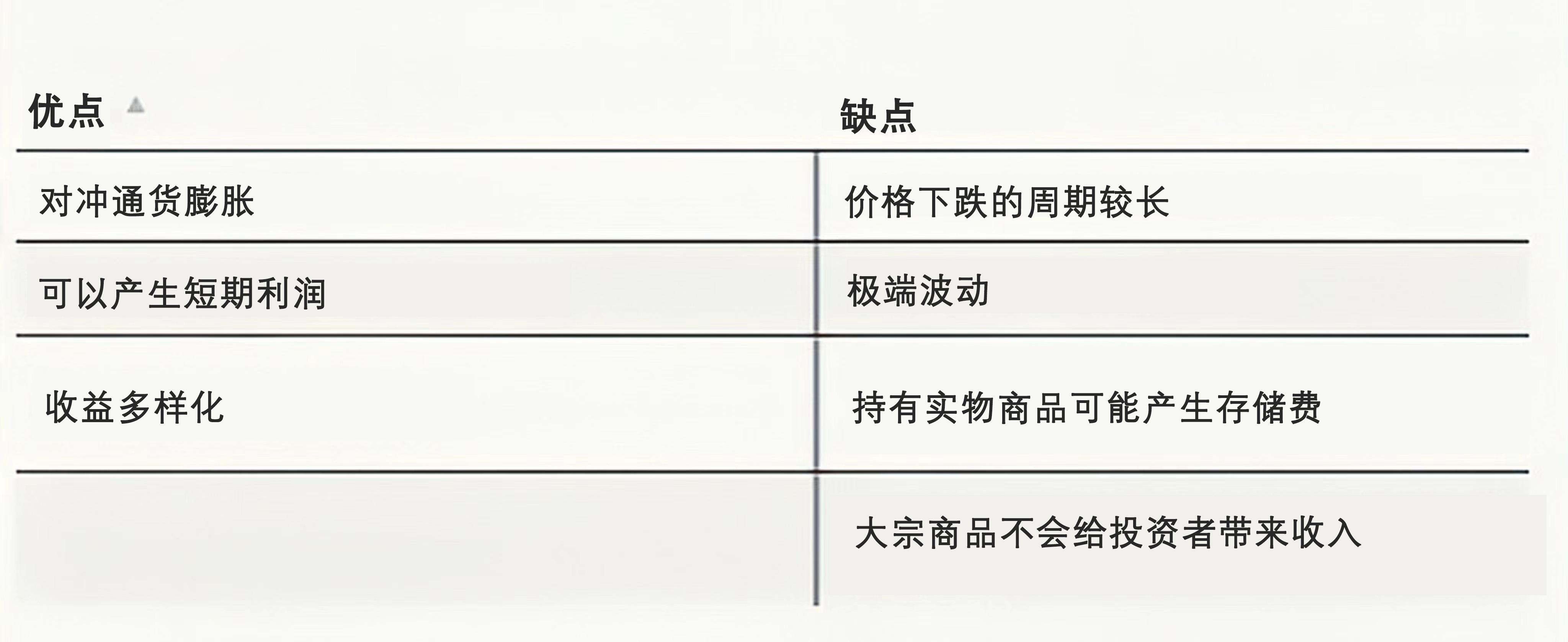什么是大宗商品?如何投资大宗商品?

投资者可以投资不同类型的资产,期待自己投入的资金能够获得利润。投资不应该局限于传统的股票和债券,有时候最有价值的投资是我们身边的有形商品,它们被称作大宗商品。
什么是大宗商品?
大宗商品这类资产包括用于生产消费品的原材料。这些原材料可以帮助投资者实现资产组合多样化,并通过不同资产类型分散风险。
特许金融分析师、特许市场技术师和Vineyard Global Advisors首席投资官托马斯·塞缪尔森表示:“大宗商品是一种商品或服务,其广泛可用性削弱了价格以外的其他因素在确定价值时的重要性(如品牌名称、独特性或吸引力等)。大宗商品是可互换的,不同来源的供应之间通常并不会出现太多差异。”
一些最常见的大宗商品包括下列几类:
• 农业:农业大宗商品通常包括咖啡、玉米、糖、大豆和小麦。这些农作物通常被用于常见消费品,也是人类和牲畜的食物来源。
• 能源:能源大宗商品包括原油(作为交通燃料和用于生产塑料)、天然气(用于发电)和汽油(用于驱动私家车辆)。
• 金属:金属包括金(用于制作首饰)、银(用于制作首饰和其他许多工业用途)和铜(最常用于生产电缆)。
• 家畜:牛和猪等常见家畜被视为大宗商品。
如何投资大宗商品?
你可以通过多种途径投资大宗商品或获得投资大宗商品的经验:
购买实物商品。投资者可以购买原料商品,例如金条。但以这种方式进行投资,需要承担与持有实物商品有关的成本,如存储费。
投资商品类股票或交易所交易基金。如果你认为投资实物商品的周期过长,你可以通过投资商品类股票,间接投资大宗商品。有一些生产或加工某些大宗商品的公司发行的股票可以进行投资。塞缪尔森表示:“通过这种方式进行投资,一方面可以获得大宗商品价格上涨带来的收益,另一方面公司可能给投资者创造附加价值,包括增加特定商品的产量或者通过发放股息给投资者带来收益。”大宗商品交易所交易基金跟踪大宗商品的价格,或者大宗商品的相关指数,使投资者持有一系列以大宗商品作为抵押的合同。
投资大宗商品的优缺点
与任何其他投资一样,大宗商品投资有优点也有缺点。如果你考虑投资大宗商品,需要注意以下几个主要优点和缺点:

优点:大宗商品可以产生短期利润。在大宗商品市场,没有办法锁定投资时机,但如果你在恰当的时间购买和出售某种大宗商品,就可能获得高额利润。塞缪尔森表示:“由于期货合约通常仅需要5%的保证金,因此你只需要初始投资5,000美元,就能控制10万美元的铜。如果铜的基础价格上涨10%,你所控制的铜的价值将从10万美元增长到11万美元,利润1万美元,你的5,000美元初始投资的回报率高达100%(初始投资5,000美元利润1万美元)。当然,你需要准确判断铜价的走向,如果实际走向与你的判断相反,你可能需要追加保证金,增加投资。”
优点:大宗商品可以对冲通货膨胀。在高通胀期间,美元贬值,大宗商品资产通常会上涨。据Vanguard在2021年根据彭博大宗商品指数(Bloomberg Commodity Index)所做的研究显示,非预期通货膨胀上涨1%,大宗商品价格会上涨7%至9%。
缺点:大宗商品具有极端波动性。虽然大宗商品的变化趋势不同于其他资产类别,但投资大宗商品依旧存在高风险。塞缪尔森表示:“众所周知,大宗商品的价格反复无常,可能很难预测大宗商品的价格波动。气候、地缘政治和全球经济前景等不可预知的事件,都可能严重影响供需,从而引发大宗商品价格波动。”
缺点:大宗商品不会给投资者带来收入。股票、债券和房地产等投资能够通过股息或租赁收入等给投资者带来稳定收益,但除非将大宗商品卖出并获得利润,否则大宗商品并不会给投资者带来收入。
启示
了解可投资的资产类型,以及各类资产常见的波动规律,有助于拓宽投资范围,实现投资组合多样化,甚至在经济动荡时期有助于对冲通货膨胀。(财富中文网)
译者:刘进龙
审校:汪皓
投资者可以投资不同类型的资产,期待自己投入的资金能够获得利润。投资不应该局限于传统的股票和债券,有时候最有价值的投资是我们身边的有形商品,它们被称作大宗商品。
什么是大宗商品?
大宗商品这类资产包括用于生产消费品的原材料。这些原材料可以帮助投资者实现资产组合多样化,并通过不同资产类型分散风险。
特许金融分析师、特许市场技术师和Vineyard Global Advisors首席投资官托马斯·塞缪尔森表示:“大宗商品是一种商品或服务,其广泛可用性削弱了价格以外的其他因素在确定价值时的重要性(如品牌名称、独特性或吸引力等)。大宗商品是可互换的,不同来源的供应之间通常并不会出现太多差异。”
一些最常见的大宗商品包括下列几类:
• 农业:农业大宗商品通常包括咖啡、玉米、糖、大豆和小麦。这些农作物通常被用于常见消费品,也是人类和牲畜的食物来源。
• 能源:能源大宗商品包括原油(作为交通燃料和用于生产塑料)、天然气(用于发电)和汽油(用于驱动私家车辆)。
• 金属:金属包括金(用于制作首饰)、银(用于制作首饰和其他许多工业用途)和铜(最常用于生产电缆)。
• 家畜:牛和猪等常见家畜被视为大宗商品。
如何投资大宗商品?
你可以通过多种途径投资大宗商品或获得投资大宗商品的经验:
购买实物商品。投资者可以购买原料商品,例如金条。但以这种方式进行投资,需要承担与持有实物商品有关的成本,如存储费。
投资商品类股票或交易所交易基金。如果你认为投资实物商品的周期过长,你可以通过投资商品类股票,间接投资大宗商品。有一些生产或加工某些大宗商品的公司发行的股票可以进行投资。塞缪尔森表示:“通过这种方式进行投资,一方面可以获得大宗商品价格上涨带来的收益,另一方面公司可能给投资者创造附加价值,包括增加特定商品的产量或者通过发放股息给投资者带来收益。”大宗商品交易所交易基金跟踪大宗商品的价格,或者大宗商品的相关指数,使投资者持有一系列以大宗商品作为抵押的合同。
投资大宗商品的优缺点
与任何其他投资一样,大宗商品投资有优点也有缺点。如果你考虑投资大宗商品,需要注意以下几个主要优点和缺点:
优点:大宗商品可以产生短期利润。在大宗商品市场,没有办法锁定投资时机,但如果你在恰当的时间购买和出售某种大宗商品,就可能获得高额利润。塞缪尔森表示:“由于期货合约通常仅需要5%的保证金,因此你只需要初始投资5,000美元,就能控制10万美元的铜。如果铜的基础价格上涨10%,你所控制的铜的价值将从10万美元增长到11万美元,利润1万美元,你的5,000美元初始投资的回报率高达100%(初始投资5,000美元利润1万美元)。当然,你需要准确判断铜价的走向,如果实际走向与你的判断相反,你可能需要追加保证金,增加投资。”
优点:大宗商品可以对冲通货膨胀。在高通胀期间,美元贬值,大宗商品资产通常会上涨。据Vanguard在2021年根据彭博大宗商品指数(Bloomberg Commodity Index)所做的研究显示,非预期通货膨胀上涨1%,大宗商品价格会上涨7%至9%。
缺点:大宗商品具有极端波动性。虽然大宗商品的变化趋势不同于其他资产类别,但投资大宗商品依旧存在高风险。塞缪尔森表示:“众所周知,大宗商品的价格反复无常,可能很难预测大宗商品的价格波动。气候、地缘政治和全球经济前景等不可预知的事件,都可能严重影响供需,从而引发大宗商品价格波动。”
缺点:大宗商品不会给投资者带来收入。股票、债券和房地产等投资能够通过股息或租赁收入等给投资者带来稳定收益,但除非将大宗商品卖出并获得利润,否则大宗商品并不会给投资者带来收入。
启示
了解可投资的资产类型,以及各类资产常见的波动规律,有助于拓宽投资范围,实现投资组合多样化,甚至在经济动荡时期有助于对冲通货膨胀。(财富中文网)
译者:刘进龙
审校:汪皓
Investors have access to a number of different types of assets that they can put their funds into to try to generate a profit. Investments don’t have to be limited to traditional stocks and bonds, sometimes the most valuable investments are the tangible goods that are all around us—these are called commodities.
What are commodities?
Commodities are an asset class made up of raw materials used to make consumer goods. These materials can help diversify an investor’s mix of assets and spread risk across different asset types.
“A commodity is a good or service whose wide availability diminishes the importance of factors other than price (such as brand name, uniqueness, or appeal) in determining its value,” says Thomas Samuelson, CFA, CMT, and chief investment officer at Vineyard Global Advisors. “A commodity is fungible, in that there is typically little differentiation between supply from different sources.”
Some of the most common commodities to invest in typically fall into one of the following categories:
• Agricultural: This type of commodity usually includes goods like coffee, corn, sugar, soybeans, and wheat. These crops are commonly used in popular consumer products and can be a source of food for humans and livestock as well.
• Energy: Energy commodities include crude oil used to fuel transportations and the production of plastics, natural gas used for electricity, and gasoline, which powers personal vehicles.
• Metals: Metals include gold, used in making jewelry; silver, also used for jewelry and many other industrial uses as well; and copper, the most widely used form of electrical wiring.
• Livestock: Popular livestock like cattle and hogs are considered commodities.
How do you invest in commodities?
There are a few different ways you might invest in commodities or gain exposure to them:
1. Purchasing the physical commodity. It’s possible to purchase a raw commodity, like a gold bar. However, if you go this route, you’ll need to account for the costs associated with holding a physical commodity like storage fees.
2. Investing in commodity stocks or ETFs. If investing in physical commodities isn’t your speed, you can indirectly invest in commodities by investing in commodity stocks. These are stocks in companies that produce or process certain commodities. “This approach benefits from both commodity price increases and the potential of the company to add value by increasing production of a particular commodity or providing income through the payment of a dividend,” says Samuelson. A commodity ETF tracks the prices of a commodity or that commodity’s corresponding index and gives an investor ownership over a set of contracts backed by the commodity.
Pros and cons of investing in commodities
Like any other investment, commodities are not without their own set of benefits and drawbacks. If you’re thinking about investing in commodities, here are some of the major pros and cons to note:
Pro: Commodities can generate short-term profits. There’s no real way to time the market, but if you happen to purchase and sell a commodity at the right time, you could generate a significant profit. "Since futures contracts generally require only a 5% margin, you could control $100,000 of copper for an initial investment of only $5,000. If the underlying price of copper rose 10%, the value of the copper you control would increase from $100,000 to $110,000 providing a $10,000 profit, but the return on your initial investment of $5,000 would be 100% ($10,000 profit on $5,000 initial investment),” says Samuelson. “Of course, you need to be right on the direction of the price of copper, and you can get a margin call requiring you to put up more money if the position moves against you.”
Pro: Commodities can be a hedge against inflation. These assets tend to rise during times of high inflation when the value of the dollar sinks. According to 2021 research from Vanguard based on the Bloomberg Commodity Index, a 1% rise in unexpected inflation would produce a 7% to 9% rise in commodities.
Con: Commodities can be extremely volatile. While commodities may not behave like other asset classes, they can still be risky. "Commodities are notoriously volatile, and predicting their price movements can be difficult,” says Samuelson. “Unknowable events such as weather, geopolitics, and the global economic outlook can dramatically impact the supply and demand, and thus the price of commodities.”
Con: Commodities don’t produce income for investors. Some investments like stocks, bonds, and real estate produce regular income for investors through dividends or rental income, but commodities do not produce income for investors unless they’re sold and a profit is realized from that sale.
The takeaway
Knowing the different types of investments available for you to invest in and how they typically behave can help you broaden your scope, diversify your portfolio, and potentially help hedge against inflation during times of economic turmoil.













